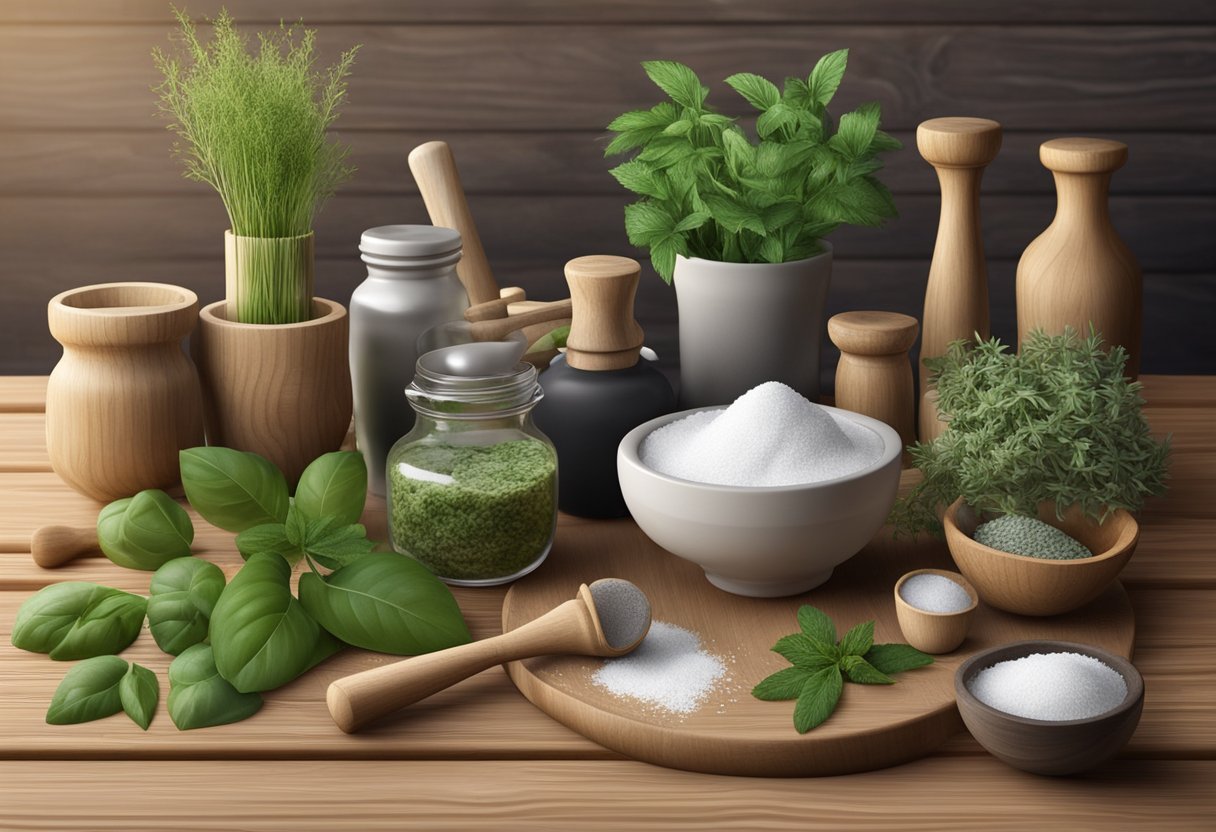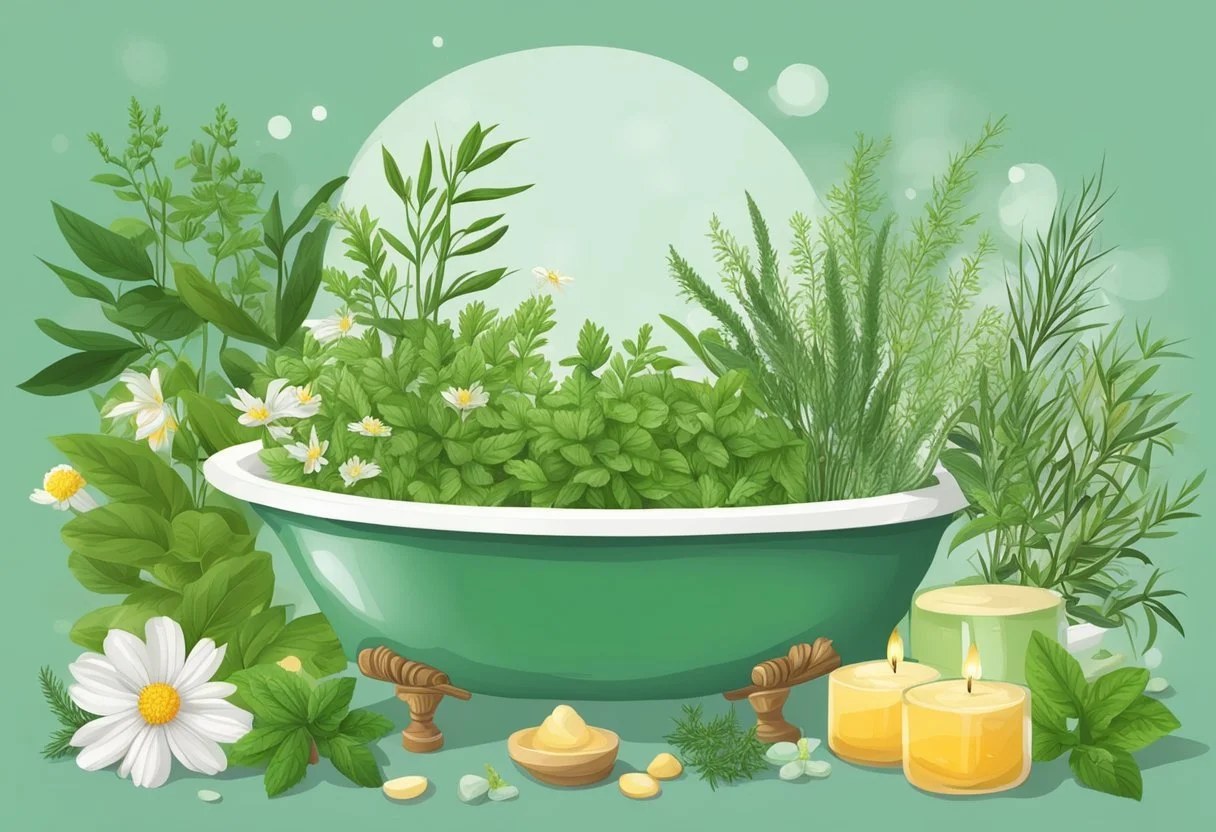Best Herbs for Baths
A Comprehensive Guide for Relaxation and Healing
This article is part of our series on Natural Health
Discover > Natural Health > Best Herbs for Baths
In the realm of self-care and relaxation, baths have long been recognized as a soothing and rejuvenating practice. Adding herbs to baths not only enhances the aromatherapy experience but also imbues the water with their healing properties. This article will explore some of the best herbs to incorporate into baths for a truly enriching and transformative soak.
Herbal bath enthusiasts benefit from the variety of ways in which these plants can be added to their bathing ritual. From simple dried-herb steeping to creating unique essential oil blends, there is no shortage of possibilities for customizing the ideal herbal bath. Experimenting with different herbs allows bathers the opportunity to find the perfect combination for their needs, whether it be relaxation, rejuvenation, or ailment relief.
Some of the most popular herbs for baths include lavender, chamomile, and rosemary, each offering distinct properties and benefits. Lavender, known for its calming effects, is perfect for inducing a sense of relaxation and tranquility. Chamomile, with its delicate scent and soothing properties, is another popular choice for a gentle, calming bath experience. Rosemary, with its invigorating aroma, provides a refreshing and revitalizing soak. In the following sections, we will delve deeper into these herbs and others to discover their unique benefits and uses in the world of herbal baths.
The Science of Herbal Baths
Herbal baths combine the power of water and the therapeutic properties of herbs, making them a popular holistic practice in herbalism. By soaking in hot water infused with various herbs, individuals can absorb the beneficial properties of these plants and improve their overall well-being.
One of the primary advantages of an herbal bath is the ease with which the body absorbs minerals and other beneficial compounds from the water. Hot water helps open the skin's pores, allowing for optimal absorption of the herbs' therapeutic properties. This process is particularly beneficial for herbs like oatstraw, which are rich in minerals and can help nourish the skin and body.
The use of hot water also aids in creating a relaxing environment that promotes mental and emotional well-being. The warmth of the water combined with the soothing effects of the chosen herbs can help reduce stress, ease tension, and encourage a sense of tranquility. Herbal baths can also provide relief for specific ailments, such as muscle aches, congestion, or skin irritations, by incorporating herbs known for their anti-inflammatory, decongestant, or soothing properties.
There are various ways to incorporate herbs into a bath, including:
Tea bags: Filling tea bags (how long do tea bags last?) with the desired herbs and submerging them into the bathwater.
Sachets: Placing herbs in a cloth sachet and allowing it to steep in the bathwater.
Loose herbs: Adding the herbs directly to the water and straining them out before entering the bath.
Selecting the appropriate herbs for an herbal bath is an essential aspect of the process. Some popular therapeutic herbs include:
Lavender: Known for its calming and relaxing properties, lavender can help to reduce stress and anxiety.
Chamomile: This herb is renowned for its soothing and anti-inflammatory effects, making it ideal for those with sensitive skin or inflammation.
Eucalyptus: With its strong, refreshing scent and antimicrobial properties, eucalyptus can help to clear congestion and provide an invigorating bathing experience.
Rosemary: This stimulating herb can help to improve circulation and alleviate sore muscles.
In conclusion, herbal baths provide a natural and holistic approach to well-being that combines the benefits of water, heat, and therapeutic herbs. By choosing the appropriate herbs and methods, individuals can create a relaxing and rejuvenating experience tailored to their unique needs and preferences.
Herbs for Bathing
Herbs have been used for centuries to enhance the bathing experience, providing both soothing and revitalizing effects. Incorporating a variety of herbs into your bath can promote relaxation, rejuvenate the skin, and indulge the senses. This section will discuss some of the best herbs to use in your next bath.
Lavender is a popular choice due to its calming and sedative properties. It is known to help relieve stress and induce sleep. Chamomile is another excellent herb for relaxation, often used to alleviate anxiety and muscle tension. Lemon balm works similarly, providing a fresh citrus scent and reducing restlessness. These herbs work well individually or in combination with each other.
For a more invigorating experience, peppermint and rosemary aid in increasing circulation and revitalizing the senses. Both have a cooling effect and can help soothe sore muscles. Mint is another option, offering a crisp and refreshing scent.
In addition to their benefits for relaxation and rejuvenation, many herbs have skin-nourishing properties. Calendula is known for its anti-inflammatory and healing effects, making it beneficial for sensitive or irritated skin. Oat tops offer a soothing and moisturizing quality that can be perfect for dry or itchy skin.
Rose petals and jasmine are both revered for their luxurious and romantic scents. They have long been used in baths to create an indulgent and aromatic atmosphere. Roses are also thought to have mild astringent and anti-inflammatory properties, improving the overall texture of the skin.
For a more invigorating bathing experience, consider using ginger to boost circulation and warm the body. Yarrow is another choice, with its cleansing and purifying properties, while sage and geranium are known for their balancing effects on the skin and hormones.
Many other herbs, such as fir, hops, and basil offer unique properties that can be explored in the context of bath time. Experimenting with different combinations of herbs can help you create the perfect blend to suit your mood and personal preferences.
In conclusion, incorporating herbs into your bath offers a multitude of benefits for the mind, body, and senses. By choosing the right herbs, you can customize your bathing experience to promote relaxation or invigoration, while also nurturing your skin.
Essential Oils for Bathing
Bathing with essential oils provides a soothing and therapeutic experience. The blend of natural plant extracts and hot water creates a relaxing atmosphere, offering numerous benefits to the mind and body. This section will discuss some essential oils that are suitable for bathing and highlight their properties.
Lavender essential oil is a popular choice for baths, as its fragrance promotes relaxation and unwinding. Renowned for its calming properties, lavender helps to alleviate stress and anxiety while promoting a restful sleep. To enjoy these benefits, simply add a few drops of lavender essential oil to the bathwater.
Eucalyptus oil is another popular option, especially for those experiencing respiratory congestion or muscle soreness. Its invigorating aroma can help to open airways and aid in clearing the mind. When used in a bath, eucalyptus oil offers a refreshing and rejuvenating experience.
Chamomile essential oil is well-known for its soothing properties. Its mild aroma can help to ease tension, reduce stress, and alleviate headaches. Incorporating chamomile oil into a bath routine is a great way to create a calm, soothing environment.
To ensure the best results, it's important to choose high-quality essential oils when creating a bath blend. Purchase oils from reputable sources and always follow the recommended dilution guidelines, typically around 10-20 drops per bath. It is also helpful to mix the essential oils with a carrier oil, such as jojoba or sweet almond, before adding them to the bathwater. This helps to ensure even distribution and prevents potential skin irritation.
Healing and Soothing Benefits
Herbs have been used for centuries to promote health, well-being, and relaxation. When incorporated into baths, various herbs provide numerous healing and soothing benefits that can enhance one's overall quality of life.
One of the most well-known benefits of herbal baths is their ability to soothe aches and pains. Herbs such as Epsom salts (how long does epsom salt last?) are renowned for their abilities to relax muscles and alleviate tension. Additionally, herbs like chamomile and lavender have calming effects on the nervous system, which can help ease the discomfort associated with tension headaches and other stress-related ailments.
Another advantage of herbal baths is their capacity to support the immune system and fend off disease. Many herbs, such as eucalyptus and ginger, are known for their antibacterial and antiviral properties. These herbs can help ward off colds and the flu, as well as more serious ailments. Soaking in a warm bath infused with these healing herbs can also improve circulation, which is essential for maintaining optimal health.
Herbal baths have been shown to promote better sleep, particularly when infused with herbs like valerian root and lemon balm. The calming properties of these herbs work in tandem with the warm water to help relax the body and promote a restful night's sleep.
Depression and anxiety can also be alleviated through the use of herbal baths. Ingredients like St. John's Wort and passionflower can help to stabilize mood and reduce symptoms of depression. Soaking in a bath blended with these herbs may provide relief from feelings of sadness, tension, and general unease.
In conclusion, the use of herbs in baths offers a myriad of healing and soothing benefits, catering to various aspects of an individual's well-being. From relieving aches and pains to combatting disease, improving sleep and reducing depression, herbal baths are a valuable addition to any health and wellness routine.
Beauty and Skin Care Through Herbal Baths
Herbal baths have been a popular choice for centuries when it comes to beauty and skin care. They are known to nourish and enhance the skin, providing a natural glow and preserving its health. Utilizing the power of various herbs and natural ingredients, these baths offer great benefits for skin and hair.
One of the most effective and widely used herbs in beauty baths is rose petals. They provide a gentle cleansing effect and have a soothing fragrance, which creates a wonderful and relaxing ambiance. Additionally, rose petals have excellent toning properties, which help in tightening the pores, thus enhancing the complexion.
In addition to rose petals, many other herbs can be used to nourish the skin and promote its health. For example, lavender has anti-inflammatory properties that can help reduce rashes and other irritations. Moreover, chamomile can alleviate skin inflammation and speed up the healing process. Mixing these herbs with warm water allows them to release their essential oils, which can then be easily absorbed by the skin.
The benefits of herbal baths extend beyond skin care; they also contribute to the overall health of hair. Herbs such as rosemary and thyme can help in improving the circulation of blood in the scalp, thus promoting hair growth. On the other hand, herbs like sage and basil can soothe an itchy scalp, making it an excellent treatment for dandruff.
In conclusion, incorporating herbs in baths not only enhances beauty but also helps in addressing various skincare concerns. By choosing the right combination of herbs, one can achieve a cleansing and toning effect, while also nourishing and revitalizing the skin and hair.
Bath Preparation Methods
In order to reap the benefits of herbs in your bath, it is crucial to prepare them properly. There are several methods to infuse your bathwater with the aromas and properties of your chosen herbs.
Pot method: Place fresh herbs (how long do fresh herbs last?) and sea salt (how long does sea salt last?) in a large pot of boiling water. Let the mixture simmer for approximately 10-15 minutes, allowing the herbs to release their essential oils. Once done, strain the water and pour it into your bathtub, mixing it with your regular bathwater.
Muslin bag method: If you prefer a less messy option, place your chosen herbs in a muslin bag or bath bag. This allows you to experience the benefits of the herbs without the hassle of cleaning up loose leaves afterward. Simply fill the bag with fresh or dried herbs, tie it securely, and suspend it under the faucet as you fill your bathtub.
Cheesecloth method: Similar to the muslin bag, a cheesecloth pouch can be used to contain your herbs in the bath. Wrap the herbs securely in a piece of cheesecloth, tie it with a string, and place it in the bath alongside your other preferred ingredients.
DIY infusions: To create a more personalized blend, prepare an herbal infusion by steeping the herbs in hot water for 15-20 minutes. Strain the liquid and add it to your bath, combined with sea salt and any additional ingredients of your choice.
Regardless of the method you choose, make sure to let the herbs properly soak before immersing yourself in the bath. This will enable the herbs to release their full potential and provide maximum benefits. Remember, it is vital to use high-quality, fresh herbs in order to attain the best possible experience from your herbal bath.
Stress Relief and Mental Well-being
Herbs have long been used for promoting relaxation and reducing stress. By incorporating certain herbs into a bath, one can achieve a calming atmosphere that promotes self-care and mental well-being.
Chamomile is a popular herb known for its gentle and soothing properties. Adding a handful of dried chamomile flowers (how long do dried chamomile flowers last?) to a warm bath can help alleviate anxiety and induce a sense of tranquility.
Lavender is another herb commonly used for stress relief. The aromatic qualities of lavender oil mixed with warm water can be immensely calming, helping to relieve tension and encourage relaxation. A few drops of lavender essential oil can be added directly to the bathwater or combined with Epsom salts for additional benefits.
For garden enthusiasts, rosemary is a versatile herb with numerous benefits. It has long been used to ease muscle tension and promote mental clarity. A simple rosemary-infused bath can be made by boiling fresh rosemary leaves in water, allowing it to cool, and then adding the water to the bath.
In times of emotional distress, a bath can serve as an excellent self-care ritual. To create a calming blend, combine herbs like lemon balm, passionflower, or valerian root. This mixture may help reduce feelings of stress while providing a sense of relaxation and balance. Simply steep the herbs in hot water, strain the liquid, and pour it into the bath.
Remember to always consult with a healthcare professional before using herbs, especially if pregnant or nursing, as some herbs may have contraindications. By incorporating these natural remedies into a self-care routine, one can cultivate a sense of peace and relaxation, providing valuable support for mental well-being.
Aromatherapy and Fragrant Herbal Baths
Aromatherapy is a holistic healing treatment which uses natural plant extracts to promote health and well-being. An essential part of aromatherapy is the fragrant herbal bath, which provides various physical and emotional benefits through the combination of warm water and fragrances. Some popular fragrant herbs for baths include rose, lavender, and orange.
Rose is an elegant, floral aroma frequently associated with love and romance. The soothing fragrance of rose offers a calming effect that helps to alleviate stress and anxiety. In addition, the use of rose in a bath can have skin-nourishing properties, improving hydration and radiance.
Lavender is a versatile herb widely recognized for its sleep-enhancing and relaxation effects. The scent of lavender has been shown to have the ability to reduce restlessness and lower blood pressure. Furthermore, including lavender in a bath can contribute to the reduction of muscle tension and promote overall fatigue relief.
Orange is another delightful fragrance, characterized by a bright, citrusy aroma that is both energizing and uplifting. The sweet scent of orange can help to improve mood and invigorate the senses. When added to a bath, orange can provide a cleansing and refreshing experience.
Incorporating these fragrant herbs in your bathing routine can provide a serene, therapeutic experience, benefiting not only the body but also the mind. Through the power of aroma, fragrant herbal baths offer an enjoyable and revitalizing element to any self-care ritual.
Medical Properties of Herbs and Salts
Epsom salt is a popular choice in bath products for its numerous health benefits. Rich in magnesium and sulfate, Epsom salt can help soothe sore muscles, reduce inflammation, and even relieve stress. One of its most notable characteristics is its ability to promote relaxation and ease tension, making it excellent for a calming bath experience.
Herbs such as orange blossom possess many beneficial properties as well. The sweet, fragrant blossoms of the orange tree can act as a natural antiseptic, useful in cleansing the skin and preventing infections. Additionally, the orange blossom has been praised for its aphrodisiac properties, known to enhance sensuality and bring positive energy to the bathing experience.
Many herbal bath ingredients also contain essential nutrients that contribute to overall health and well-being. Calcium, for instance, is vital for maintaining strong bones and teeth, and it can be found in various herbs and salts. Potassium, on the other hand, is crucial for proper nerve and muscle function and can be found in some natural bath products.
Similarly, herbs rich in vitamin C provide antioxidant benefits that help protect the skin from damage and promote collagen production. This essential nutrient possesses anti-inflammatory properties as well, which can help reduce redness and irritation in sensitive skin.
In summary, incorporating herbs and salts into your bath routine can provide numerous medical benefits, including antiseptic, anti-inflammatory, and aphrodisiac properties, as well as essential nutrients such as calcium, potassium, and vitamin C. By choosing the right combination, you can create a relaxing and rejuvenating bathing experience that promotes overall well-being.
Precautions and Safety
It is essential to consider some precautions and safety measures when using herbs for baths, especially for children. Though herbs offer numerous benefits, it is crucial to use them responsibly and moderately.
Firstly, it is vital to identify potential allergens. When experimenting with new herbs, perform a patch test on a small area of the skin to ensure no allergic reactions occur. Always consult a healthcare professional, especially when using herbs for children, as their skin can be more sensitive and prone to reactions.
Secondly, ensure the quality of the herbs. Choose organically grown, pesticide-free herbs to avoid exposure to harmful chemicals. It is also essential to store them in a cool, dry place away from direct sunlight to maintain their potency and freshness.
Lastly, be cautious when combining herbs. Some herbs work well together, while others might not. Do thorough research on which combinations are safe, and never use herbs that are contraindicated for specific pre-existing medical conditions or medications.
By following these guidelines, you can enjoy a relaxing and beneficial herbal bath experience while prioritizing safety for all ages.
Natural Health Solutions for Respiratory Health and Skin Care
Natural health practices can provide a range of benefits for respiratory health and skin care. Chest rubs made with natural ingredients like eucalyptus oil, peppermint oil (how long does peppermint oil last?), and coconut oil can help to relieve congestion and promote healthy breathing. These ingredients can be mixed together and gently rubbed onto the chest and throat for a natural and effective solution.
Zinc supplements can provide a range of benefits for skin health, including reducing inflammation and promoting healthy collagen production. Zinc can also help to support immune function and reduce the risk of infections.
Hydrating face masks made with natural ingredients like honey, avocado, and aloe vera can help to moisturize and nourish the skin. These ingredients can be mixed together and applied to the face for a natural and effective solution for dry or dehydrated skin.
Hummus can be a healthy addition to a Candida diet, providing essential nutrients like protein, fiber, and healthy fats. Chickpeas, the main ingredient in hummus, are also rich in vitamins and minerals like iron, magnesium, and zinc.
By incorporating natural health practices into your daily routine and making healthy choices for respiratory health and skin care, you can support your overall health and well-being in a sustainable and holistic way. It's important to do your own research and consult with a healthcare professional before using any new remedies or making significant changes to your diet or lifestyle.
#bath herbs #herbal tea #herbal bag #healing bath #promote supple skin #himalayan pink salt (how long does himalayan pink salt last?) #bath tea #favorite herbal baths #bath salts





